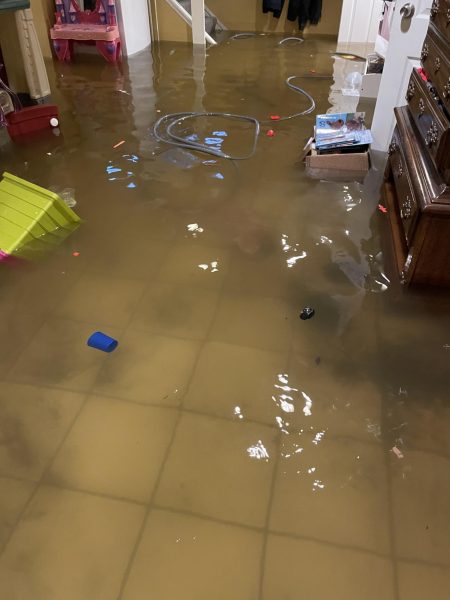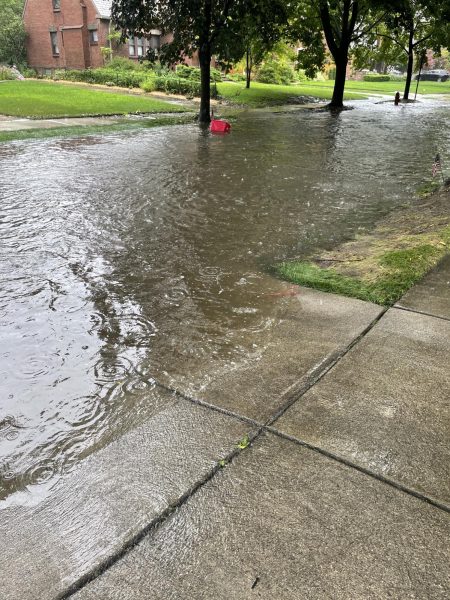Water up to your knees, power outages and destroyed basements have become the new normal in Grosse Pointe and surrounding communities.There are multiple factors which have contributed to this increased rate of flooding—most notably, outdated drainage systems and climate change.
From students to teachers, the recent flooding has affected a large part of the South community. Kate Rillema ’24 said she experienced several feet of water in her basement, damaging decorations and other memorabilia.“We got a couple feet of water, I’m five feet tall, and (the water) was up to my knees and we lost a lot of stuff,” Rillema said.
Since that flood, Rillema said her family have built a two story garage in which they now store all valuables in case of another flooding. Fortunately for the Rillema family, this flood was a one-time ordeal, but others aren’t so lucky.
Science teacher Troy Hernandez said he had 8-10 inches flooding in his basement three times within the last five years.
This year, there was also flooding in his classroom.“(The hardest part was) not knowing if you were going to flood,” Hernandez said. “Every time it rained, you’d wonder if you’d have water in your basement, and that’s a big part of our home, so that just made it so we couldn’t be at ease at all with every chance of rain, even if it was a little bit.”

The massive rain storms combined with faulty piping systems have led to citizens needing to take matters into their own hands, which can become stressful quickly. Many have put in draining pumps, vacuums, and taken valuables out of their basement to prevent any serious damage to important items.
“Many residents had put in their own preventative measures, which start off around eight to nine thousand dollars,” Hernandez said. Even that is only superficial stuff they can do.”
Not only do these floods and storms act as a stress inducer, but they also are a rude awakening to some of the harshest effects climate change has thrown our way.
Along with the melting ice that leads to an overwhelming amount of water and rainfall all around the world, there are other direct consequences.“As a whole, everyone is trying to wrap their heads around what’s going on (and) why we’re having these storms,” Hernandez said. “(There are also) extreme droughts followed by extreme storms, these massive wildfires. I think everyone is just scared; they don’t know what to expect or what curveballs nature is going to throw at them.”
Along with the unexpectedness of nature and climate change, the mechanics behind the sewage and drainage system also play a role in the increased flooding of the area. According to Mark VandenBoom, retired Road Engineer for Macomb County, the job of the sewers is not being effectively fulfilled; the majority of the drainage system in Grosse Pointe is outdated.
“A lot of older communities have what’s called a combined sewer system,” VandenBoom said. “That means there’s a pipe where anything that goes down the sink would be going down to a sanitary swerve. There’s also a storm sewer out in the street where all the water flows through the grates.”
The main problem with the storm sewers is their proximity to each other. According to VandenBoom, several sewers drain towards the same area, making it very easy for the system to get overpowered, which causes floods to occur.
“In a lot of older cities, (storm sewers) are closer together, flowing into the street at the same time,” VandenBoom said. “ I suspect Grosse Pointe does still have (that system). It makes it even more difficult when a rainstorm comes to keep it from backing up and flooding.”

According to VandenBoom, ensuring the systems are up to date and able to handle heavy amounts of rainfall at the same time are key factors in combating the risk of flooding.
“Do a lot of good maintenance,” VandenBoom said. “The sewers have debris, some have collapsed, or even cracks in them. You just have to keep up with this stuff.”
Even with floods being a more consistent occurrence over the last couple of years, making sure the sewage system runs smoothly is only part of the efforts to reduce flooding.
Climate change also plays a big role, and according to Senior Environmental Attorney Julie Goodwin, not only does climate change affect flooding of local communities, but also affects biodiversity. Wildlife such as Lake Whitefish, which are economically, spiritually, and culturally valuable to various tribal nations in Michigan, are being put at risk.
“Warmer water has led to reduced ice coverage in the Great Lakes,” Goodwin said. “Reduced ice coverage, in turn, has weakened the ecosystem that protects Lake Whitefish eggs making the eggs more susceptible to wave damage and predators, leading to the decline. This loss would be hugely consequential.”
There are many different ways for people to help prevent the increased speed of climate change every day. For example, replacing single-use plastic with non-plastic alternatives, like shampoo and conditioner bars, improves the chances of preventing the planet from becoming too hot too quickly.
“Buy local produce, research companies, be an informed buyer,” Goodwin said. “If everyone makes little changes at home, it doesn’t just add up, it creates a collective change.”
Climate change has also caused air quality to worsen from situations like the Canadian wildfires, hurricanes and floods to become more serious.“The intensity and frequency of those events are what makes climate change a big deal,” Goodwin said. “An individual, alone, cannot stop climate change from occurring, but that doesn’t mean that we should all stop trying.”













































































Pamela Walsh • Sep 27, 2023 at 1:42 pm
Interesting article. Well researched,